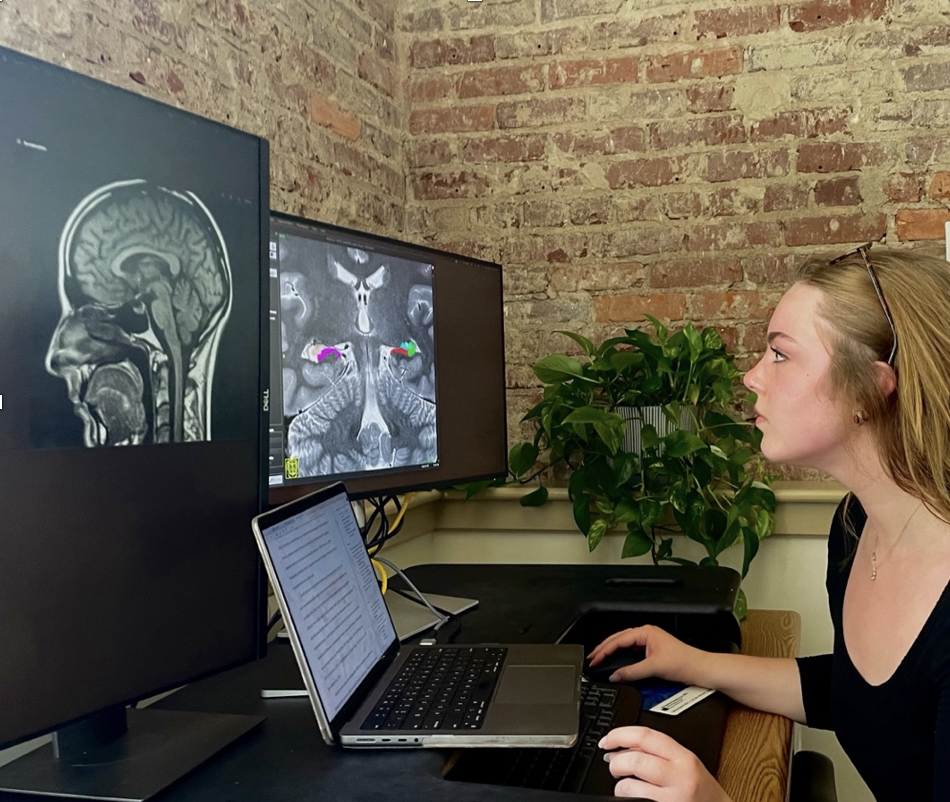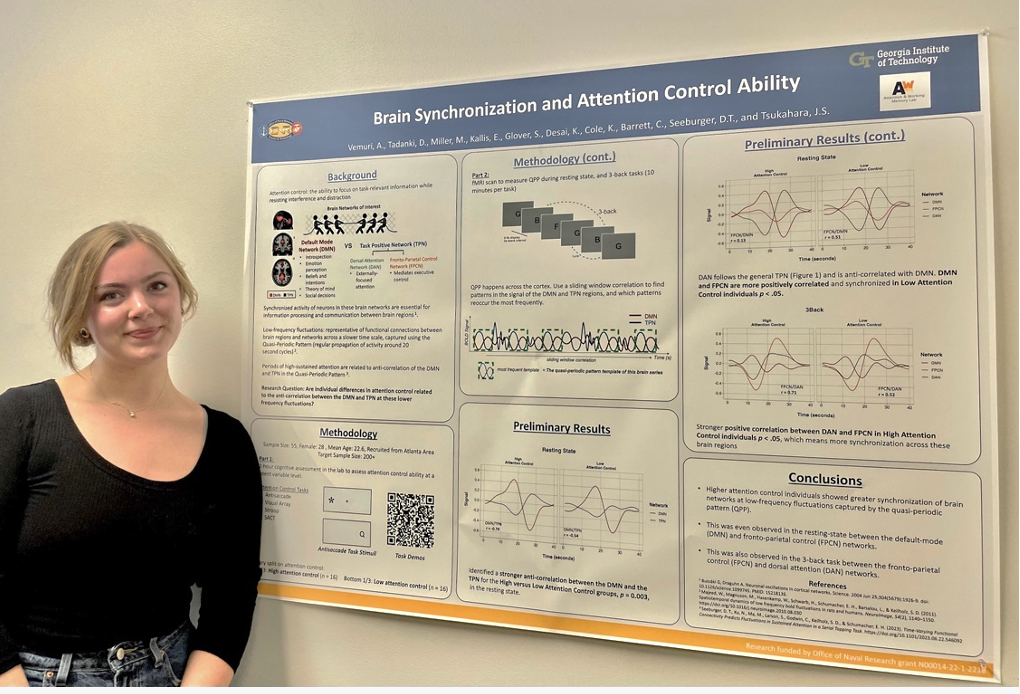Kate Cole is a 3rd-year Psychology major studying attention control with Dr. Randall Engle. She also studies spatial memory with Dr. Thackery Brown.

How long have you been an undergraduate researcher at Georgia Tech?
I have been a researcher at Georgia Tech for one year. I joined the Attention & Working Memory (A&WM) lab in August of 2023, and I recently joined the Memory, Affect, and Planning (MAP) lab in May of 2024.
How did you get involved with undergraduate research?
In the summer of 2023, I studied abroad on the Scotland Summer Program and befriended several Psychology and Neuroscience undergraduate students who were involved in research. Our conversations about research became some of my favorite memories from that program, and I decided I wanted to see if research might be a good path for me. Upon returning home, I researched labs here at Georgia Tech. Dr. Randall Engle and the Attention & Working Memory lab’s work stood out to me, so I emailed the lab and interviewed for a research assistant position. As they began seeing my passion and enthusiasm for the lab’s work, the graduate students, post-docs, and even Dr. Engle himself began including me in conversations at a deeper level. After that, I became even more interested and invested in the research the A&WM lab does.
I have also recently branched out and am working in Dr. Thackery Brown’s Memory, Affect, and Planning lab. This began in the spring of 2024, when I took Dr. Brown’s Learning & Memory course. Much of what we learned in the course complimented the work I was doing in the A&WM lab, and the course’s emphasis on neuroscience sparked my interest in a new direction. I wanted to know as much as I could about the content, and I would often stay late talking with Dr. Brown about the class and his own research. One day after class, I asked Dr. Brown if his lab was accepting any research assistants over the summer. Luckily for me, they were.
What are you working on?
This past semester, I was honored to be presented with the President’s Undergraduate Research Award (PURA) to complete a research project in the A&WM lab. This award allows select undergraduate students to design and conduct their own research project, supported and funded by Georgia Tech. My PURA project evaluates whether the reliability and validity of behavioral measures of attention control differ based on the chosen scoring technique. In the field of cognitive psychology, there is a lot of discussion about how we should measure the ability to control attention. My results will help build consensus amongst researchers about the nature of attention control.
In the MAP lab, I’m helping graduate students with several projects, including one that uses Virtual Reality to explore differences in curiosity based on spatial design. In another project, we’re segmenting subregions of the hippocampus using fMRI to better understand how the different parts of the hippocampus interact with each other to support different memory abilities.

What is your favorite thing about research/researching?
Without a doubt, my favorite thing about the research we do is that it’s enormously people-oriented. While most every type of research aims to benefit society in one way or another, research in Cognitive Psychology and Neuroscience is “by people, for people.”
The “by people” component, for me, is rooted in the research community at Georgia Tech, especially the two labs I work in. I’ve collaborated with so many highly qualified and intelligent people, and these communities have been some of the most supportive environments I’ve ever been a part of. From my first day, my mentors saw my potential for achievement. Their encouragement helped me to realize that I can attain great things in research and beyond, and they continue to show me what it looks like to think creatively about science, to use high-quality methods to answer interesting questions, and to love your career.
The other component of this research is “for people.” Every day, we get to interact with people from our community as they participate in our studies. Our work wouldn’t be possible without them, and meeting people who may, one day, benefit from our findings has been one of the coolest experiences of my life.
What are your future plans and how has research influenced them?
Upon arriving to Georgia Tech, I felt immense pressure to know what I wanted to pursue. I knew I was fascinated by Psychology and Neuroscience, and although I immediately considered scientific research, I also explored medicine and public policy. However, after meeting students who fell in love with research and trying it for myself, my path became clear. My undergraduate research experiences have been truly transformative. They've ignited a passion in me that makes me excited to continue questioning and exploring for the rest of my life. The people I’ve encountered have supported me with their time, effort, and expertise, which they’ve selflessly shared with me. These people and these experiences have made me realize that research is not just a part of my undergraduate education - it's a path I want to follow for years to come.
Recently, I was accepted to present at the Psychonomic Society Conference in New York City to present the findings from my PURA research project. This is a huge accomplishment for me, and I was honored to receive the acceptance. I have also been accepted to Georgia Tech’s BS/MS program in Psychology, with a focus in research, and I plan to pursue a Ph.D. in either Neuroscience or Psychology after I graduate.
